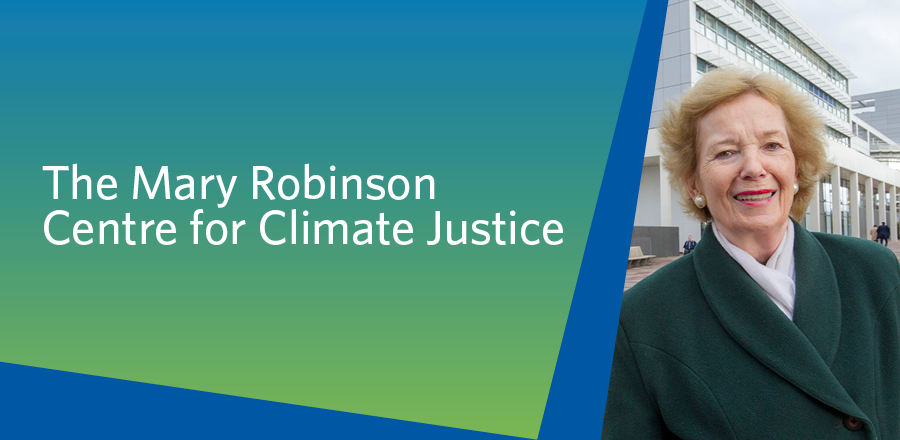Mary Robinson honoured by GCU’s Centre for Climate Justice

Glasgow Caledonian University’s innovative Centre for Climate Justice has been renamed in honour of the global advocate who helped found it.
Former Irish President Mary Robinson, an honorary graduate of GCU, helped establish the Centre in 2016 and has been a key special advisor to its researchers and students ever since.
At a special event held today (May 11), the Centre was formally renamed as the Mary Robinson Centre for Climate Justice.
The Centre’s mission is to advance fundamental theories, policies, processes, practices, approaches, and methodologies on tackling the impacts of climate change through a climate justice lens.
Its team takes a global lead in the delivery of evidence-based research directed towards generating a deeper understanding and critical insight into the societal and injustice impacts of climate change. It utilises this evidence to provide recommendations towards improving policy and practice on embedding climate justice solutions into global and local climate change projects, programmes and frameworks of action.
The Centre is also home to the globally unique MSc Climate Justice and Climate Justice Doctoral Training Programme. Through its tailored educational offerings, its students and graduates form a new cadre of climate-justice leaders locally and globally.
The Centre’s director, Professor Tahseen Jafry, said: “Mary’s thought leadership has provided the Centre with inspiration and drive to ensure that issues of climate justice, equity and human rights are used as guiding principles for all our research, as well as our postgraduate courses. This distinction being formally recognised by Mary is not only an honour and privilege, but it makes us even more determined to build on our mission with partners in Scotland, and globally, advancing climate justice”.
Mary Robinson said: “I have always been impressed by the great work of Glasgow Caledonian University’s Centre for Climate Justice and how it champions a human-centred approach to tackling the climate crisis, not just through its research but by encouraging its students to be sustainable leaders of the future, therefore it is a great honour for the Centre to recognise me in this way. I look forward to continuing to work with the Centre and the students at GCU in the coming years.”
Professor Pamela Gillies CBE FRSE, GCU’s Principal and Vice-Chancellor, said: “Like our University for the Common Good, Mary is passionate about the transformative power of education for climate stewardship. This special event presented an opportunity for students, graduates, and the wider GCU community, to put their questions first-hand to one of the world’s most renowned voices on climate change, and to learn how we can all become climate justice changemakers.”
The audience at the event also heard from Morgan Mickelson, GCU Alumni of the Year 2021, who studied MSc Climate Justice. She said: “I was looking for the next stage in my education. Everything in the US, where I am from, seemed very business focus – how can we save businesses money? It was then I found the programme at GCU. It was human centred. That’s what I wanted and so I came over to study at the Centre for Climate Justice. The programme has shaped my ability to think critically in my career, with local government, and how to put people at the centre of all policy decisions.”
Mary Robinson was the first woman President of Ireland and former UN High Commissioner for Human Rights; Chair of The Elders; a passionate advocate for gender equality, women’s participation in peace-building, human dignity and climate justice. She is a globally recognised voice on climate justice and frequently highlights the need for drastic action from world leaders to protect the most vulnerable who have contributed least to climate change. Mary received an honorary degree from GCU in 2004.
The Mary Robinson Centre for Climate Justice is committed to quality education and research that addresses the overarching objective of the United Nations Sustainable Development Goals of ‘leaving no one behind’. The work of the Centre aligns with the SDGs through its research, education, and knowledge exchange activities locally and globally:
SDG 1: No Poverty, SDG 2: Zero Hunger, SDG 3: Good Health and Well-Being, SDG 5: Gender Equality, SDG 7: Affordable and Clean Energy, SDG 8: Decent Work and Economic Growth, SDG 10: Reduced Inequalities, SDG 13: Sustainable Cities and Communities, SDG 17: Partnerships for the Goals.
Going forward the centre will embrace the key principles of climate justice, originally formulated by Mary Robinson which champion a human-centred approach to tackling the climate emergency.
